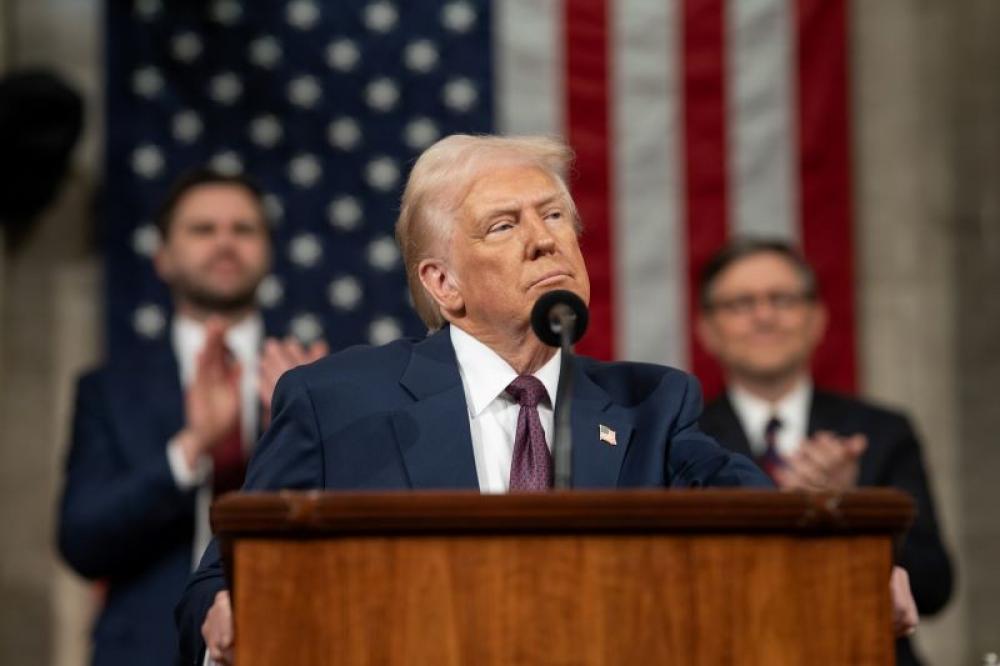Just Earth News | @justearthnews | 12 Apr 2025, 07:03 am Print
 US Tariffs
US Tariffs US Donald Trump recently announced reciprocal tariffs on several nations before pausing its implementation for 90 days. Photo Courtesy: White House X handle
Global trade could shrink by three per cent as a result of the United States’ new tariff measures, which in the longer term could reshape and boost as-yet untapped regional commercial links, a top UN economist confirmed on Friday.
“There will be shifting, I think, in supply chains, there will be a reassessment of global alliances. There will be geopolitical shifts and economic as well,” said Pamela Coke-Hamilton, head of the International Trade Centre (ITC).
Speaking in Geneva after Wednesday’s announcement by the White House of a 90-day pause on “reciprocal tariffs” for most countries with the exception of China, Mrs. Coke-Hamilton noted that exports from Mexico had already been “highly impacted” by earlier seismic changes to US trade policy.
“Countries like Mexico, China and Thailand, but also countries in southern Africa are among the most affected, alongside the US itself,” she said.
While the 90-day pause on the so-called reciprocal tariffs applies to imports from most countries and brings down rates to a still hefty 10 per cent, tariffs on imports from China currently stand at 145 per cent.
China, meanwhile, has raised tariffs against US exports – in effect import taxes on goods – to 125 per cent.
Already, Mexico’s products for export have shifted away from markets such as the US, China, Europe and other Latin American countries to make “modest gains” instead in Canada, Brazil “and to a lesser extent, India”, the ITC chief insisted.
Shifts In Trade Flows
Other countries have followed suit, including Vietnam, whose exports “are redirecting away from the US, Mexico and China”, while “increasing substantially” towards the EU, Republic of Korea and others, said Mrs. Coke-Hamilton, whose UN specialised agency offers assistance to developing countries.
The problem for emerging economies is that they are less well equipped to “pivot” when faced with “instabilities”, the ITC chief explained, since they often lack the manufacturing diversity and ability to add value to raw commodities of more industrialized nations.
Especially vulnerable trading partners of the US include Lesotho, Cambodia, Lao PDR, Madagascar and Myanmar that are “the most exposed”, she continued.
Confirming that the World Trade Organization (WTO) had estimated that commerce between China and the US could drop by up to 80 per cent if the highly unusual situation continues, the ITC Executive Secretary pointed out that they constituted only “three per cent to four per cent of world trade…[so] there is 96 per cent out there that is still trading and that will trade”.
'No Stability'
Nonetheless, the impact of the “indeterminate extension of 90 days on and on” has not been good for global commerce and “does not necessarily lend itself to stability”, Mrs. Coke-Hamilton continued.
“Irrespective of whether there is an extension, on and on, the fact that there is no stability, there is no predictability will affect trade and firms and decisions that are being made in real time.”
She added: “This would not be the first time that there have been tremors in the world economic system. We have seen it over the last 50 years in different dispensations. This one is probably a little more harsh, a little more tremulous.”
(With inputs from IBNS)
- Fire and smoke at US Embassy in Riyadh after drones assault
- Pakistan: Thousands attend funeral prayers of seven people killed during US Consulate protest over Khamenei's death
- Middle-East conflict: IAEA urges restraint amid ongoing strikes
- Mobile World Congress 2026: MediaTek to unveil latest developments in 6G, 5G-Advanced CPE
- Saudi oil giant targeted? Drone debris sparks fire at Ras Tanura refinery





-1763561110.jpg)
